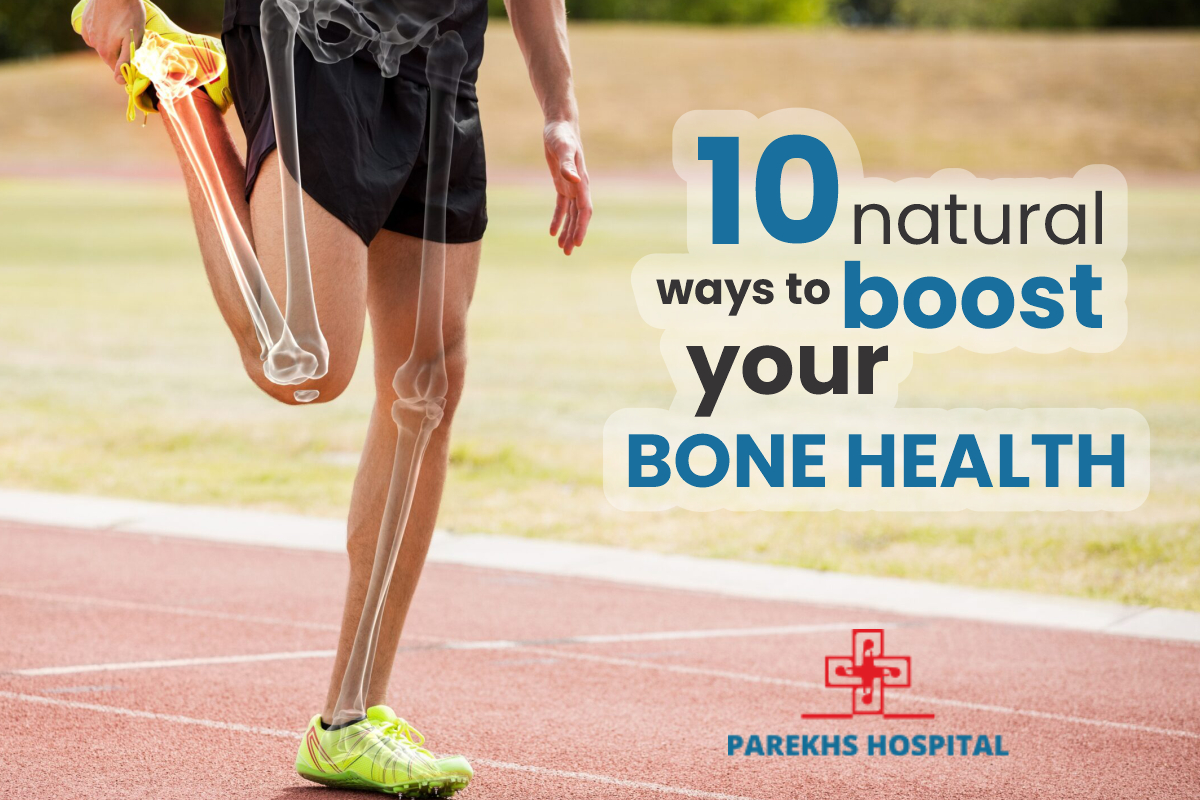How to keep bones healthy during winters

It is December. Are you one of those asking Google ‘Why do my bones hurt in winter?’ or ‘How to make your bones strong in Winter?’ Please do not be worried, as you aren’t alone. 30% of the population faces risk of bone fractures in the winter months. And this is mainly due to slips and weaker bones. So How to Keep Bones Strong During winter? We are sharing 7 simple steps for healthy bones, strong bones not just in winter but all the year round!
7 Ways to Maintain Healthy Bones in Winter
1. Maintain a Balanced Diet
Studies link poor nutrition to higher osteoporosis risks. Whether it is summer or winter, when you ask us – How to make your bones strong- this is the foremost advice we give as medical experts. Please eat calcium and vitamin D-rich foods like dairy, leafy greens, almonds, and fatty fish. Calcium strengthens bones, and vitamin D propels its absorption. Research shows adults need 1,000-1,200 mg calcium daily, while postmenopausal women may require more. Limit salty foods, as sodium depletes calcium.

Also you need to include magnesium via nuts, seeds and phosphorus via meat, eggs for overall bone health. Additional Bone health tips:
- 1. Have an adequate protein diet to avoid fracture risks by giving your muscles ample strength.
- 2. Regularly check vitamin D levels, especially in winter as sunlight exposure decreases.
- 3. For strong bones limit the use of caffeinated drinks because it forces calcium loss through urine.
2. Stay Hydrated
Water is essential for joint lubrication and bone health. Healthy bones tissue contains about 31% water, making hydration crucial. Winter dryness can mask thirst; set reminders to drink water regularly. Studies reveal dehydration reduces bone metabolism efficiency, because dehydration reduces the cushioning between bones, increasing injury risk.
So you need to aim for 2-3 liters of fluids daily, be it water, soups or herbal teas. Proper hydration also supports blood flow thereby delivering essential nutrients to bones.
3. Exercise Regularly
Studies suggest 150-300 minutes of moderate activity weekly boosts bone density. Healthy bones demand weight-bearing exercises like brisk walking, jogging or dancing. This helps stimulate strong bones’ growth and strengthen joints. Regular physical activity improves both strength and flexibility. So what all you can do for strong bones is:

- 1. Balance exercises like tai chi prevent falls.
- 2. Stretching improves joint mobility.
- 3. Cold weather can stiffen muscles, so warm up thoroughly before exercising.
- 4. Wear proper footwear for grip.
- 5. Caution: High-impact sports benefit younger adults but might harm those with weak bones.
4. Protect Yourself from Cold-Related Injuries
Bone health tips also demand protection of the body! Studies show pelvic-bone fractures are 25% higher in winter months, due to slipping on snow-laden paths or some slippery surfaces at home. Thus you need to ensure such surfaces are clear or else you need to wear slip-resistant footwear. For indoors, add rugs or mats to prevent slipping. Wear warm layers to prevent muscle stiffness.
In case you have any past injury, be cautious because cold restricts blood flow, thereby slowing the bone repair. You need to keep warm with heating pads. Physiotherapy helps improve mobility and balance in colder months. Test bone density if you’re prone to injuries.
5. Maintain a Healthy Weight
Being overweight adds pressure to joints, accelerating wear and tear of the cartilage as well as bones. Conversely, underweight individuals have weaker bones, increasing fracture risks. So to Keep Bones Strong During round the year, you must aim to keep your BMI (Body Mass Index) between 18.5 and 24.9 because medical studies link extremes to poor bone health. Go back to our bone health tip No 1 and maintain a healthy diet, that will help you stay fit and reduce weight in a healthy way.
6. Get Sufficient Sleep
Poor sleep disrupts calcium-regulating hormones; and this weakens bones over time. Medical experts indicate that those sleeping under 6 hours had 30% lower bone density. Also, sleep allows bone cells to repair and regenerate. Adults need 7-9 hours nightly for optimal health. How to get a good sleep for strong bones:

- 1. Limit your screen-time before bed; stop using your phone one hour before you go to bed. Why, because blue light from screens blocks melatonin thereby disrupting the sleep cycle.
- 2. A bedtime routine without the use of any screen, like reading a book, will help you sleep early and peacefully.
- 3. Soothing, meditative music that enhances relaxation can also be heard before sleeping
7. Consider Supplements
When diet alone doesn’t meet nutrient needs, in that case orthopaedic doctors suggest healthy bones need health supplements:
- 1. Calcium and vitamin D are most vital. Studies recommend 800-1,200 IU of vitamin D daily for adults, especially in low sunlight seasons.
- 2. Magnesium supports calcium absorption
- 3. Vitamin K2 directs calcium to bones.
- 4. Omega-3 fatty acids improve joint flexibility. Older adults benefit from collagen peptides to boost bone mineral density.
CAUTION: Over-supplementing can harm kidneys; consult a doctor. Blood tests help determine deficiencies.
How to make your bones strong: Myth or Fact
1. You Don’t Need to Worry About Bone Health in Winter – Myth
Bone health needs attention year-round, including winter. Cold weather reduces outdoor activity, Sunlight (vitamin D), and hydration, which weakens bones. Studies show fractures increase in winter due to slips and poor muscle flexibility.
2. Only Older Adults Need to Focus on Bone Health – Myth
Bone health starts young. Peak bone mass develops by age 30. Neglecting it earlier leads to weak bones later. Kids and teens need calcium and exercise for growth. Adults must prevent bone loss with good habits.
3. Staying Indoors in Winter Keeps Your Bones Safe – Myth
Staying indoors limits sunlight (vitamin D), causing weaker bones. WHO data reveals over 200 million people globally suffer from osteoporosis which is often made worse by low vitamin D levels in winter. Thus, regular outdoor activities will improve bone density and flexibility.
Tried everything, but still the joint pain suffering is intolerable. Don’t suffer in silence, take expert advice from doctors or book a consultation at PAREKHS HOSPITAL for advice, supplements, or tests if needed. Take simple steps today to keep your bones healthy in future!






